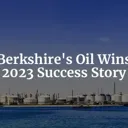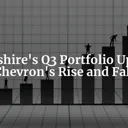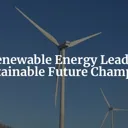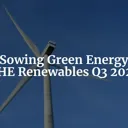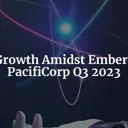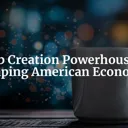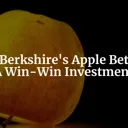Tags: Chevron / Earnings / ESG
This fanpage is not officially affiliated with Berkshire Hathaway: Disclaimer
Attention Berkshire Hathaway shareholders! Dive into the captivating tale of Chevron's 2023 journey—a year of financial challenges, strategic initiatives, and a steadfast commitment to shareholder value. Discover the impact of Chevron's lower profit, higher dividend, and strategic alignment with Berkshire Hathaway's investment philosophy. Uncover the complexities of sustainable transformation in the energy sector and the implications for your investment portfolio.
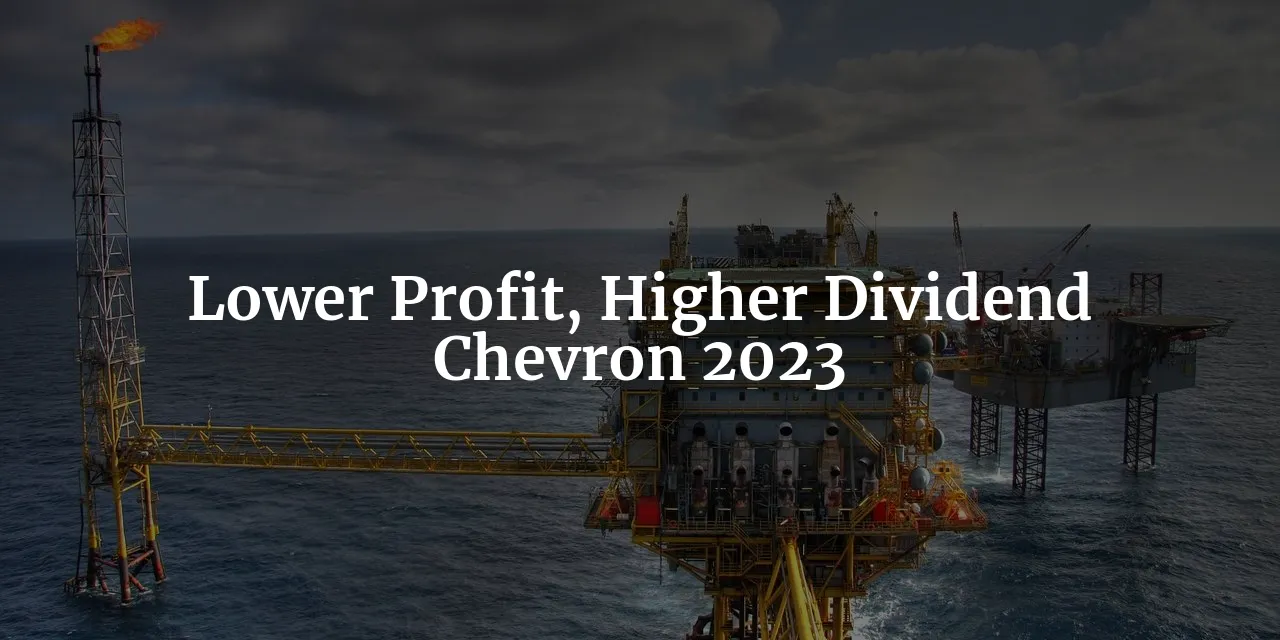
Introduction
In the vast ocean of investment, Berkshire Hathaway, under the stewardship of Warren Buffett, has long navigated with a compass pointing towards value. This philosophy has seen the conglomerate amass a portfolio of significant stakes in companies that not only promise robust returns but also demonstrate resilience and strategic foresight. Among these prized holdings, Chevron stands out as a beacon, with Berkshire Hathaway's investment worth approximately $16.8 billion, making up 4.8% of their stock portfolio 1 ↗. This investment underscores the energy giant's pivotal role within Berkshire Hathaway's constellation of investments.
The tale of Chevron in 2023, however, unfolds with a narrative of challenge juxtaposed with opportunity. Despite Chevron's financial performance revealing a lower profit in Q4 2023, a decision that has resonated positively across the investment community is the increase in dividends. This move not only signifies Chevron's commitment to shareholder value but also shines as a silver lining for Berkshire Hathaway shareholders amidst the financial downturn. The year saw Chevron grappling with missed earnings expectations, a significant reduction in net income and profit margin, and a challenging operational landscape 2. Yet, in the face of these adversities, Chevron's strategic maneuvers to enhance shareholder returns through dividends and share buybacks have been noteworthy 3.
This introduction sets the stage for a deeper exploration into Chevron's 2023 journey—a year marked by financial ebbs and flows, strategic decisions aimed at bolstering shareholder confidence, and a steadfast commitment to environmental stewardship amidst brewing controversies 46. As we delve into the intricacies of Chevron's financial performance, strategic initiatives, and the broader implications for Berkshire Hathaway shareholders, we aim to weave a narrative enriched with historical, political, and economic insights, offering a comprehensive understanding of the unfolding dynamics.
Chevron's Financial Performance in 2023
The financial landscape of Chevron in 2023 was a testament to the myriad challenges and uncertainties pervading the global energy sector. The company reported a revenue of US$200.9 billion for the fiscal year, marking a 15% decline from the previous year. Net income took a more significant hit, plummeting by 40% to US$21.4 billion, with the profit margin narrowing to 11% from 15% in FY 2022. Earnings per share (EPS) also saw a downturn, falling to US$11.41 from US$18.37 in the preceding year 2. These figures fell short of analyst expectations, with revenue missing estimates by 1.2% and EPS by a stark 14%, reflecting the broader economic pressures and operational challenges facing the company.
The financial downturn can be attributed to a confluence of factors, including volatile oil prices, global economic headwinds, and operational hurdles. Despite these challenges, Chevron's stock price saw a modest uptick of 2.1% from a week ago, hinting at investor optimism or perhaps a belief in the company's long-term resilience. This optimism, however, must be tempered with the reality that revenue is forecasted to decline by an average of 3.6% per annum over the next three years, signaling potential headwinds on the horizon.
The following table summarizes Chevron's financial performance metrics for FY 2023, which provides a quick reference to these key figures, offering a snapshot of the company's financial health in a challenging year 2:
| Chevron Metrics | FY 2023 | FY 2022 |
|---|---|---|
| Revenue | $200.9bn | $236.4bn |
| Net Income | $21.4bn | $35.7bn |
| Profit Margin | 11% | 15% |
| Earnings Per Share | $11.41 | $18.37 |
Despite the downturn, it's crucial to note that Chevron has maintained a strong investment grade, reflecting its financial robustness and strategic positioning within the broader energy sector. This performance, set against the backdrop of 2023's tumultuous economic landscape, offers a nuanced understanding of Chevron's current standing and its implications for investors and stakeholders alike.
Analyzing Chevron's performance in comparison to Exxon Mobil adds a fascinating dimension to understanding the dynamics of these industry giants. Examining key metrics in the following table reveals striking parallels between the two, signaling a stable and promising financial future for both companies 5:
| Company | Net Income - 2023 | Net Income - 2022 | Biggest Profit Since | Key Actions |
|---|---|---|---|---|
| ExxonMobil | $36bn | $55.7bn | 2012 | Acquired Pioneer Natural Resources for $60bn, committed to increasing oil and gas production |
| Chevron | $21.4bn | $35.5bn | 2013 | Acquired Hess for $53bn, highlighted investment in low-carbon businesses, opted not to sign up to a decarbonisation charter at COP28 |
The Silver Lining: Dividend Increase and Shareholder Returns
Despite a challenging year that saw Chevron's profit take a sharp downturn, the company managed to find a silver lining that shone brightly for its shareholders. In a decisive move, Chevron's board approved an 8% increase in its quarterly dividend to $1.63 beginning in March 3. This strategic decision not only underscores Chevron's commitment to shareholder returns but also marks a significant point of interest for investors, particularly those holding stakes in Berkshire Hathaway.
For Berkshire Hathaway, which owns about 6% of the outstanding Chevron stock, this dividend increase translates into a substantial uplift in annual dividend income. Given Berkshire's approximately $16.8 billion stake in Chevron, the increase in dividends could enhance Berkshire's annual income from Chevron by millions, reinforcing the value of its investment 1.
The decision to return $26.3 billion to investors in 2023, through a combination of $11.3 billion in dividends and $14.9 billion in share buybacks, despite a 65% fall in net income to $2.3 billion, is a testament to Chevron's resilient shareholder return strategy 3. This approach not only boosts investor confidence during times of lower profits but also highlights Chevron's robust record of dividend growth, making it an appealing choice for long-term investors.
Comparatively, Chevron's strategy of maintaining a strong dividend and engaging in significant share buybacks sets it apart from some peers in the energy sector. The psychological and financial impact of consistent dividend increases cannot be overstated, as it reinforces investor trust and loyalty, especially in volatile markets. Furthermore, the $14.9 billion in share buybacks in 2023 plays a crucial role in enhancing shareholder value, reducing the number of outstanding shares, and potentially increasing the earnings per share over time 3.
Berkshire Hathaway's Stake in Chevron
Berkshire Hathaway's significant stake in Chevron, amounting to approximately 6% of the company's outstanding stock, is a clear indicator of Warren Buffett's confidence in the energy giant 1 ↗ ↗. This investment, which cost Berkshire $13.8 billion and has netted a 22% gain so far, is a strategic component of Berkshire's diversified portfolio 1.
Warren Buffett's investment philosophy, which emphasizes long-term value, profitability, and strong management, finds a solid match in Chevron. The company's ability to navigate the tumultuous energy market, coupled with its commitment to shareholder returns, aligns well with Buffett's criteria for investment. The recent dividend increase further bolsters the attractiveness of Chevron as a long-term investment, potentially influencing Buffett's outlook on the company amidst the current energy landscape.
Given Berkshire Hathaway's substantial ownership, it's conceivable that the conglomerate could wield some influence over Chevron's corporate decisions ↗. However, Buffett's history of passive investment strategies suggests that any influence would likely be exerted through long-term faith in Chevron's management rather than active involvement.
The implications of Chevron's financial performance and strategic decisions, including the dividend increase, on Berkshire Hathaway's investment cannot be understated. It not only enhances the immediate financial return through increased dividends but also potentially elevates the long-term value of Berkshire's stake in Chevron.
Historically, Buffett has shown a keen interest in energy stocks, viewing them as critical components of a balanced investment portfolio. Chevron's role in Berkshire's portfolio, especially in the context of its performance and strategic initiatives, is reminiscent of past investments where Buffett sought companies with the potential for steady growth, solid returns, and resilience in the face of market fluctuations.
Chevron's dividend increase and overall shareholder return strategy in 2023, despite lower profits, not only underscore its commitment to investors but also highlight the strategic importance of its relationship with significant shareholders like Berkshire Hathaway. As Chevron navigates the future, its alignment with Berkshire Hathaway's investment philosophy and the potential for continued financial returns bode well for both entities in the evolving energy landscape.
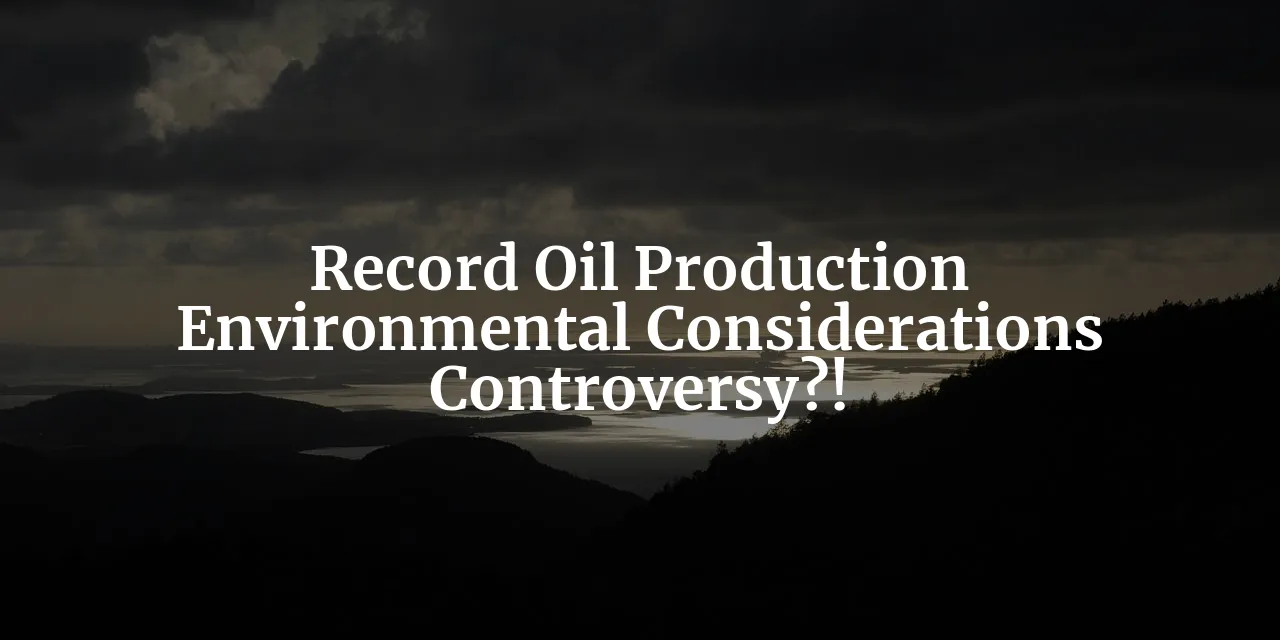
Chevron's Strategic Initiatives and Future Outlook
In the face of a challenging fiscal year 2023, Chevron has embarked on a series of strategic initiatives aimed at not only navigating the current downturn but also positioning itself for long-term success. Despite a forecasted average revenue decline of 3.6% per annum over the next three years 2, Chevron is not standing still. The company's commitment to reducing carbon intensity and its significant investments in low-carbon businesses underscore a transformative shift in its operational focus 6.
A pivotal element of Chevron's strategy is its record production of 3.1 million oil-equivalent barrels per day in 2023, powered by a notable 14% growth in the U.S. 3. This milestone not only highlights Chevron's operational efficiency but also sets a robust foundation for future earnings amidst fluctuating oil prices. Furthermore, Chevron's decision to increase its capital expenditures by nearly 16% to $4.4 billion in Q4 2023, compared with $3.8 billion in the same period a year ago, is a testament to its commitment to long-term growth and sustainability goals 3.
Chevron's strategic roadmap also includes a significant focus on reducing its carbon footprint. With over 120 GHG abatement projects and plans to spend more than $350 million on these initiatives in 2023, Chevron is taking concrete steps towards its ambitious goal of achieving net zero upstream emissions (scope 1 and 2) by 2050 6. The company's investments in wind and solar projects, alongside collaborations to develop a GHG quantification and reporting methodology for LNG cargoes, reflect a holistic approach to sustainability 6.
However, Chevron's journey is not without its challenges. The projected decline in revenue underscores the need for the company to continuously innovate and adapt to the evolving energy landscape. As Chevron navigates these challenges, the potential impact of its strategic decisions on its long-term financial performance and market positioning cannot be understated. For investors like Berkshire Hathaway, Chevron's ability to balance growth with sustainability and navigate the complex energy market dynamics will be critical in determining the continued investment in the company.
Environmental Considerations and Controversies
Chevron's environmental track record has been a subject of intense scrutiny and controversy. The company's history of toxic waste and oil spills, including the collective dumping of 18 billion tons of toxic waste and spilling of 17 million US gallons of petroleum by Chevron and Texaco, has marred its reputation 4. Moreover, accusations from environmentalists and human rights groups, such as the jailing of Steven Donziger and compelling the US Federal Government to deny Donziger due process of law, have further fueled the controversy 4.
In response to these challenges, Chevron has made significant strides in addressing its environmental impact. The company's commitment to reducing carbon intensity and achieving net zero upstream emissions by 2050 reflects a strategic pivot towards sustainability 6. Chevron's efforts to reduce methane intensity by more than 50% since 2016, alongside its goal to spend approximately $2 billion on carbon reduction projects through 2028, underscore its dedication to environmental stewardship 6.
However, the tension between Chevron's environmental initiatives and the criticism from various stakeholders highlights the complex landscape in which major oil companies operate ↗. While Chevron's environmental strategies may be more advanced compared to some of its peers, the legacy of past controversies continues to influence investor sentiment and the company's brand reputation.
The role of investors like Berkshire Hathaway in influencing corporate environmental policies cannot be understated. As major shareholders, they have the potential to drive significant change within the companies they invest in. For Chevron, the support and scrutiny from such investors are crucial in ensuring that its environmental commitments translate into tangible actions and outcomes.
Chevron's strategic initiatives and response to environmental considerations and controversies paint a picture of a company at a crossroads. As Chevron seeks to navigate the challenges of a changing energy landscape, its ability to balance operational success with environmental responsibility will be critical in shaping its future. For stakeholders, including investors like Berkshire Hathaway, Chevron's journey offers a unique insight into the complexities of sustainable transformation in the energy sector.
Conclusion
The tale of Chevron in 2023 is one marked by financial challenges, strategic initiatives, and a steadfast commitment to shareholder value. Despite a lower profit in Q4 2023, the decision to increase dividends by 8% shines as a silver lining for shareholders, particularly for Berkshire Hathaway. The significance of this dividend increase cannot be overstated, as it not only enhances the immediate financial return for Berkshire Hathaway but also potentially elevates the long-term value of its stake in Chevron.
Chevron's strategic initiatives, including a focus on reducing carbon intensity and achieving net zero upstream emissions by 2050, offer a glimpse into the company's transformative shift towards sustainability. However, the company's environmental track record and controversies present a complex landscape in which major oil companies operate. The balancing act Chevron must perform between delivering shareholder value, navigating financial challenges, and addressing environmental concerns underscores the complexities of the energy sector.
The strategic alignment between Berkshire Hathaway's investment philosophy and Chevron's long-term potential is evident, with Warren Buffett's confidence in the energy giant reflecting a strategic component of Berkshire's diversified portfolio. As the energy sector undergoes a transition towards renewable energy sources, Chevron's ability to balance growth with sustainability and navigate market dynamics will be critical in determining its future.
In the broader context, the importance of patient, value-oriented investing, as exemplified by Warren Buffett's approach to managing Berkshire Hathaway's portfolio, cannot be understated. Investors are encouraged to consider the broader implications of investing in energy stocks during times of economic and environmental uncertainty, performing their due diligence, and considering both financial performance and corporate responsibility when making investment decisions.
As Chevron navigates the future, its commitment to shareholder value, strategic initiatives, and environmental responsibility offers a unique insight into the complexities of sustainable transformation in the energy sector. The implications of Chevron's financial performance and strategic decisions, including the dividend increase, underscore the company's pivotal role within Berkshire Hathaway's portfolio and the broader investment landscape.
References
-
Warren Buffett: 12 Chevron transactions (Berkshire Hathaway / CVX) - stockcircle.com ↩↩↩↩
-
Chevron Full Year 2023 Earnings: Misses Expectations - finance.yahoo.com ↩↩↩↩
-
Chevron earnings fall but shareholders see record windfall in 2023, company raises dividend 8% - www.cnbc.com ↩↩↩↩↩↩
-
Chevron Corporation - Wikipedia - en.wikipedia.org ↩↩↩
-
ExxonMobil and Chevron notch second-biggest annual profits in decade - www.ft.com ↩
-
Actions to Reduce our Carbon Intensity - www.chevron.com ↩↩↩↩↩↩
